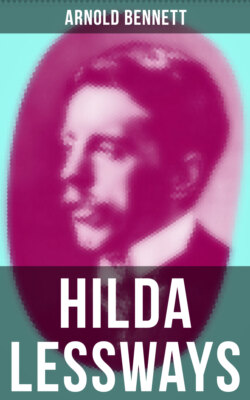Читать книгу HILDA LESSWAYS - Arnold Bennett - Страница 30
На сайте Литреса книга снята с продажи.
i
ОглавлениеArthur Dayson, though a very good shorthand writer, and not without experience as a newspaper reporter and sub-editor, was a nincompoop. There could be no other explanation of his bland, complacent indifference as he sat poking at a coke stove one cold night of January, 1880, in full view of a most marvellous and ravishing spectacle. The stove was in a room on the floor above the offices labelled as Mr. Q. Karkeek’s; its pipe, supported by wire stays, went straight up nearly to the grimy ceiling, and then turned horizontally and disappeared through a clumsy hole in the scorched wall. It was a shabby stove, but not more so than the other few articles of furniture—a large table, a small desk, three deteriorated cane-chairs, two gas brackets, and an old copying-press on its rickety stand. The sole object that could emerge brightly from the ordeal of the gas-flare was a splendid freshly printed blue poster gummed with stamp-paper to the wall: which poster bore the words, in vast capitals of two sizes: “The Five Towns Chronicle and Turnhill Guardian.” Copies of this poster had also been fixed, face outwards, on the two curtainless black windows, to announce to the Market Square what was afoot in the top storey over the ironmonger’s.
A young woman, very soberly attired, was straining at the double iron-handles of the copying-press. Some copying-presses have a screw so accurately turned and so well oiled, and handles so massively like a fly-wheel, that a touch will send the handles whizzing round and round till they stop suddenly, and then one slight wrench more, and the letters are duly copied! But this was not such a press. It had been outworn in Mr. Karkeek’s office; rust had intensified its original defects of design, and it produced the minimum of result with the maximum of means. Nevertheless, the young woman loved it. She clenched her hands and her teeth, and she frowned, as though she loved it. And when she had sufficiently crushed the letter-book in the press, she lovingly unscrewed and drew forth the book; and with solicitude she opened the book on the smaller table, and tenderly detached the blotting-paper from the damp tissue paper, and at last extracted the copied letter and examined its surface.
“Smudged!” she murmured, tragic.
And the excellent ass Dayson, always facetiously cheerful, and without a grain of humour, remarked:
“Copiousness with the H2O, Miss Lessways, is the father of smudged epistles. I’m ready to go through these proofs with you as soon as you are.”
He was over thirty. He had had affairs with young women. He reckoned that there remained little for him to learn. He had deliberately watched this young woman at the press. He had clearly seen her staring under the gas-jet at the copied letter. And yet in her fierce muscular movements, and in her bendings and straightenings, and in her delicate caressings, and in her savage scowlings and wrinklings, and in her rapt gazings, and in all her awful absorption, he had quite failed to perceive the terrible eager outpouring of a human soul, mighty, passionate, and wistful. He had kept his eyes on her slim bust and tight-girded waist that sprung suddenly neat and smooth out of the curving skirt-folds, and it had not occurred to him to exclaim even in his own heart: “With your girlishness and your ferocity, your intimidating seriousness and your delicious absurdity, I would give a week’s wages just to take hold of you and shake you!” No! The dolt had seen absolutely naught but a conscientious female beginner learning the duties of the post which he himself had baptized as that of ‘editorial secretary.’
